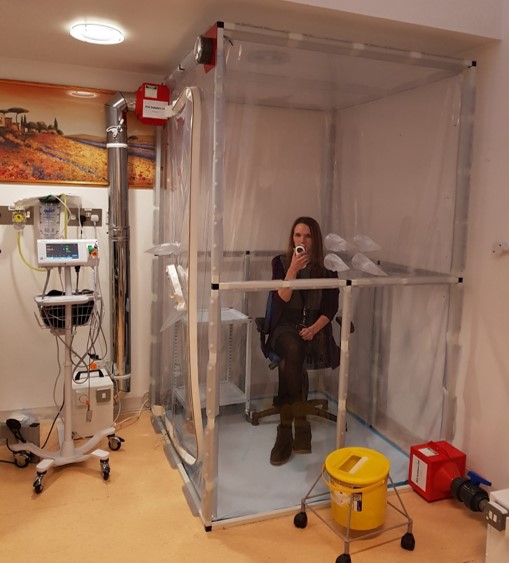The University of Oxford has begun a new clinical trial that aims to test tuberculosis (TB) vaccine safety and the host immune response in a first-in-human aerosol mycobacterial challenge infection model.

The TB045 trial is being conducted with healthy adult volunteers in partnership with the Coler Lab at Seattle Children’s Research Institute (SCRI) and supported by the National Institute of Health and Care Research (NIHR) Oxford Biomedical Research Centre (BRC).
TB is a disease caused by the bacterium Mycobacterium tuberculosis and in 2023 was the leading cause of death from an infectious disease globally. The only current licensed vaccine against TB is Bacillus Calmette-Guérin (BCG), which has remained unchanged for over a century.
BCG is a weakened form of Mycobacterium bovis, which is very similar to Mycobacterium tuberculosis and is normally given as an injection in the skin at birth in areas with endemic TB. Although BCG is safe to give to infants, it does not provide life-long protection and drugs against TB are not enough to stop the financial and social burden of the disease.
An effective vaccine is urgently needed to reduce the spread of TB, prevent progression to active disease and save lives.
The University of Oxford’s Jenner Institute is developing a pioneering human challenge model to test new TB vaccines. A challenge model, where a healthy volunteer is deliberately given a pathogen in controlled conditions, is used to test if new vaccines work, before larger field studies are carried out to assess efficacy.
These models have been used to test other vaccines such as malaria, where volunteers are purposefully given malaria after the trial vaccine to see if the vaccine works. In this challenge model, volunteers will be given BCG as a representative mycobacterium aerosol challenge, as it would not be ethical to give study participants live Mycobacterium tuberculosis.
In this study 24 volunteers will receive the new TB vaccine (called ID93+GLA-SE) and 24 volunteers will receive no vaccine at all as a control. All the volunteers will then be challenged with BCG to assess the immune response to the ID93+GLA-SE vaccine after an aerosol mycobacterial challenge.
The volunteers will use a bronchoalveolar lavage procedure to obtain samples from the lungs 14 days after their challenge infection to see if BCG remains in the airways. The results may indicate whether the vaccine is likely to be successful against Mycobacterium tuberculosis and should be further tested in efficacy trials in TB endemic countries.
Professor Helen McShane, Professor of Vaccinology at Oxford’s Jenner Institute and the Director of the NIHR Oxford BRC, explains: “The only vaccine we currently have against TB is the BCG, which unfortunately is not very effective against lung TB. We are looking at ways to deliver vaccine to the cells that will first encounter TB bacteria, and this trial should give us important information about how our lungs respond to the early stages of infection.
“It will also be vitally important in the development of inhaled vaccines, which could be a much more effective way of protecting against many respiratory illnesses.”
This is the first time an aerosol BCG-challenge model will be used to test a new TB vaccine. As well as the Oxford BRC, the study is funded by the National Institute of Health’s National Institute of Allergy and Infectious Diseases as part of the IMPAc-TB consortium and is being conducted in collaboration with SCRI. The study is now open to recruitment and will start vaccinating participants in January 2025.
The team is looking for healthy volunteers, both those who have had a BCG vaccine, and those who have never had a BCG vaccine. Volunteers will be reimbursed for their time, travel and inconvenience. Please see the Jenner website for more information and the application questionnaire.
The TB045 human clinical trial-related work is included in the Phoenix IMPAc-TB contract award funded by NIH/NIAID.